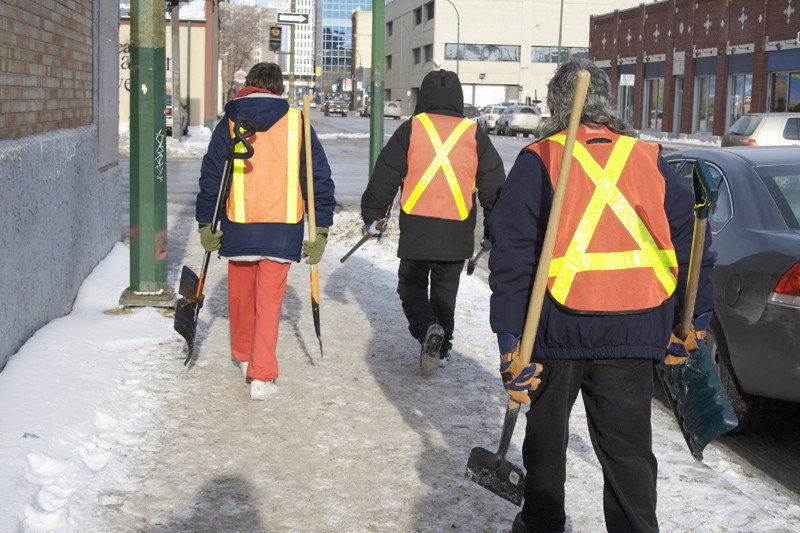Employing the unemployed
Siloam Mission program employs Winnipeg’s homeless, needs funds and resources
Winnipeg’s downtown sidewalks may look a lot cleaner thanks to a program that employs the city’s homeless population with beautification projects – like picking up litter or removing snow – along the streets and sidewalks of the inner city. The Mission: Off the Streets (MOST) program was created in 2006 as a partnership between the Downtown Business Improvement Zone (BIZ) and Siloam Mission.
“Revitalizing the inner city goes beyond attracting people; we must address the problems within our local community,” said Stefano Grande, executive director of the Downtown BIZ.
MOST was established in order to provide nearly unconditional employment for the city’s homeless. The only requirements are that participants show up for work sober and that they actively participate in Siloam Mission’s transitional support programs, like counseling to help with housing issues or addiction recovery, said Grande.
Although the program has helped many homeless Winnipeggers find employment and support, it remains underfunded and understaffed.
Wilard Andrew Mitchel is a 50-year-old recovering alcoholic who has worked through the program for over a year. He hopes he can graduate into full-time employment by the spring.
Mitchel spent the majority of his life on the Poplar River First Nation reserve located on the east side of Lake Winnipeg before moving to Winnipeg nine years ago. Mitchel’s 18-year marriage, which produced four children, ended in divorce and he began to drink more and more heavily before spending six years on and off the streets of downtown Winnipeg.
“I lost everything,” he said. “I drank away my life savings.”
During the initial months of the program, Mitchel found it difficult to transition into full-time employment.
“When I first started [the program] I went back to drinking and smoking my weed ... it was just part of my life, so I go back to my old ways,” he said. “You will never go hungry in this city if you know where the resources are. But I didn’t just need food, I needed a job and to be given a chance.”
Mitchel now works five days a week from 8:30 a.m. to 3 p.m. for the minimum wage provided by MOST. Since starting with the program he has found adequate housing and has gone through various support programs to increase his self-esteem and battle his addiction. Now, he says, he needs the resources to find full-time employment in Winnipeg’s job market.
Out of the 50 participants the MOST program has fostered in the last four years, 11 have graduated into full-time employment elsewhere.
“Personally, I feel great about that figure,” said Frank Ulrich, acting director of the MOST program. “Resume writing and job counseling [however] are things that need to be more developed.”
In order to strengthen employment supports, the MOST program requires more teamwork and greater partnerships among those in the community, said Ulrich.
The Downtown BIZ provides $30,000 to $40,000 in funding for the program per year. However, due to increased demand for employment, the BIZ would like to double or even triple that contribution if it can receive the assistance to do so. Siloam Mission receives 85 per cent of its funding through private donations.
“Unfortunately, because of limited funds we can only provide opportunities to a limited number of people,” said Ulrich. “Organization wide we have a wealth of volunteers, but when it comes to the MOST program, there is a tremendous need.”
There is currently only one volunteer that works consistently on MOST, which is not enough to provide the job counseling needed for its current eight participants, he said.
Published in Volume 64, Number 20 of The Uniter (February 25, 2010)








